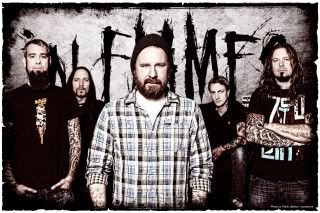IN FLAMES - Do You Fear What I Hear?
June 19, 2011, 13 years ago
By Carl Begai
When IN FLAMES did the unthinkable in 2002 and ditched their trademark death metal delivery for a more melodic and modern edged sound on the Reroute To Remain album, fans were hedging bets the band would be history within a couple years or slink meekly back to the realms of growls and grind. For all but the most open-minded follower, In Flames had committed suicide. Rather than buckle under what can only be called murderous scrutiny at the outset of this new chapter, the band stuck to its vision and moved on to record three more albums with their updated sound, earning a new legion of fans in the process.

Almost 10 years on and In Flames has undergone another major change, arguably even more significant than altering their sound. During the cycle for their 2008 album, A Sense Of Purpose, founding guitarist Jesper Strömblad announced his departure in the interest of beating down his ongoing issues with alcohol. With one of the key songwriters in the band gone, In Flames’ creative flow was presumably cut by a third, leaving the fans to cringe at the thought of how drastic the sonic changes would be when new album Sounds Of A Playground Fading finally surfaced.
“People need to know that we didn’t part ways because we don’t like Jesper or because we have musical differences,” says frontman Anders Friden. “We just couldn’t work together any more. As we move ahead in our career, the more responsibilities we have as a band and there are more and more people working with us. If there is a person, especially within the band, who isn’t there 100% it causes a lot of problems. You don’t want to step on the toes of someone who is your friend, and it was sad to see things happen the way they did, but we’re a unit and that unit needs to function properly.”“I think the band is bigger than the individuals in it,” he adds. “It worked for a while through the hiccups here and there, but when we would go on tour we weren’t sure if Jesper was going to show up. It put a lot of stress on everyone. On a personal level, it hurts the way things went down because Jesper is a friend and I’ve known him for many, many years. I wish things had been different.”
The situation is an echo of the recent turmoil within the DREAM THEATER camp, which saw drummer and founding member Mike Portnoy leave the band in September 2010. Granted, Portnoy cited being burnt out and needing a break rather than having to battle any personal demons, but like Portnoy, Strömblad was a key element of his band’s creative process.
Maybe so, says Friden, but Strömblad - since replaced by former band member Niclas Engelin - was not the be-all-and-end-all of In Flames.

“It’s sad,” Friden agrees, “but we’ve continued on and we write as we’ve always done. It’s only me and Björn doing the songwriting now, but to be honest there isn’t a huge difference compared to when we were writing with Jesper.”
Gelotte sees things a little differently, or at least from the perspective of someone who has just been handed the keys to a house he isn’t sure he can afford. He was responsible for all the music on new album, and turned in some excellent work in the end.
“There's a huge difference in how the songs were written this time. Jesper quit, so I wrote all the music. First we talked about maybe we should work together on the material anyway, but Jesper didn't want to tour for it, which put is in a weird dilemma because it was really important to work on the songs all the way through. After Jesper left I sat down and saw if there was any juice left. It was really weird because Jesper and me did all the music writing together for the last 15 years. It was very strange not having him around.”“It was very interesting from my point of view,” Gelotte adds. “It took a hell of a lot longer to write the songs because I had to rearrange stuff for the lyrics. I also had to adapt to certain things that I never had to be concerned about in the past. I had to rewrite riffs and it was like, ‘What the fuck..? It’s perfect already.’ And the guys would say ‘No, it needs this…’ Aw, come on guys (laughs). It was a good challenge for me.”
As mentioned, Friden was confident in Gelotte’s abilities to carry the music on his own. The only sense of real pressure Gelotte felt came from within, and even then it was tempered by the In Flames family bond.

“We had the opportunity to do things a little bit differently,” Gelotte continues. “We worked more around the vocals than we’ve ever done before. In the past we focused on the vocals in the last week of recording, and maybe they didn’t get the attention they needed.”
Case in point with the track ‘Ropes’, a song that is all about Friden’s performance and is guaranteed to freak out some of the more critical fans lurking in the aisles.
“I fucking freaked when I was doing it,” Friden laughs. “When we were in the middle of doing vocals for the track I just stopped him and realized we were doing a song without any screams whatsoever. It was good to know that it had come naturally, which was a surprise to both of us. I did some tracks on Come Clarity that had clean vocals, but not leaning more on the heavy side. I definitely had more time, and we did put more into the vocals, definitely.”“I had a bunch of lyrics written, like I always do when I go into the studio, but as we went along I felt I had to approach things from a different angle because I wanted to put more into the vocals. I started writing the lyrics from the beginning, and then we started coming up with melodies and arrangements. Believe it or not, a lot of things on this album were very spontaneous. Obviously, we thought about what we’re doing, but there are parts on the album that were very spur-of-the-moment and we just went with the flow. We’re still the best band in the world to write an In Flames song (laughs). Wake us up in the middle of the night and we can write you an In Flames riff when we’re half asleep, but to be able to twist and turn the formula and take the music to new places is what made making this album interesting for me.”
In Flames is constantly moving forward, yet many older fans insist on holding the new material up against the early death metal albums like Lunar Strain (1994), The Jester Race (1996) and Whoracle (1997) and carving it to pieces. Asked how he feels about battling their past in 2011, Friden could care less about the hate that gets splattered all over the world wide web.
“If we look at the album we can take one riff and remove all the studio production we have on it, put it through the same shitty conditions we had on Lunar Strain and stick it in the middle of that album, I promise you, you won’t hear a difference. We’re still the same. We’ve never tried to escape from our past. Our intention has always been to bring out past with us. As I said, we can turn our sound inside out, but we’re still able to keep the melody and the aggression. If you can hear elements of Whoracle or Colony or one of our other albums on the new one, that’s awesome.”











